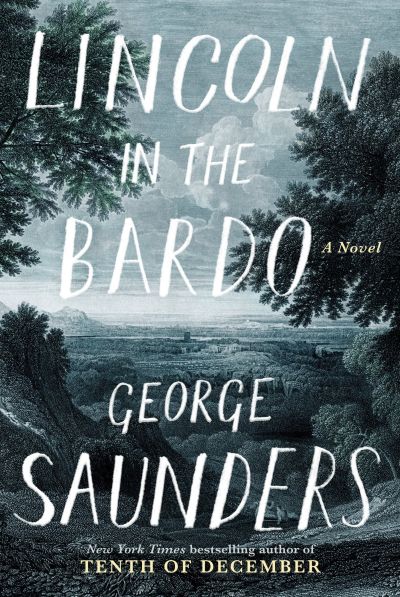Rise Up Singing
Lincoln in the Bardo
By George Saunders

14 Sep, 2023
George Saunders’s 2017 Lincoln in the Bardo is a short supernatural/historical novel.
Assured by doctors that their son Willie would recover, President Abraham Lincoln and First Lady Mary proceed with a lavish party. Willie spends his last hours before dying of typhoid listening to the sound of revels elsewhere in the White House.
Neither the President nor the First Lady take the loss well. Abraham Lincoln’s actions have consequences for the boy’s afterlife.
The first destination for the dead is the bardo, where shades confront their failures before moving on to whatever waits after the bardo. Adults often hesitate to embrace this necessary process. Indeed, many of the shades Willie finds himself among refuse to admit that that they are dead and avoid vocabulary referencing their current state. Such persons experience long, unpleasant stays in the bardo.
Children for the most part die without excessive baggage, have little trouble coming to terms with their immediate post-mortal circumstances and soon move on. There’s no reason why Willie should not follow this path as well … save for his grief-stricken father.
Lincoln visits Willie’s temporary crypt on several occasions to hold his dead son’s body. Aware of what transpires in the living world, Willie is unwilling to move on as long as there is a chance his father will visit again. Thus, like the adult shades around him, Willie remains in the bardo.
The longer shades are in the bardo, the more disturbing the changes it works on shades. The other shades are loath to see Willie suffer needlessly. However, how can they save Willie when they cannot save themselves?
[break]
While Saunder’s has borrowed concepts from Buddhism, his afterlife does not map one to one onto the Buddhist expectations.
While reading this short novel I was reminded of the Connie Willis novel Lincoln’s Dreams. Or to be more precise, I remembered just how much I had disliked Lincoln’s Dreams. I decided that Lincoln in the Bardo was in all ways superior … and then wondered if should reread Willis’ dreadful novel to see if that wretched book is as terrible as I remember. I can see no way in which this could go horribly wrong.
In stark contrast to certain other Lincoln-related speculative fiction novels I could mention, Saunders does not paper over the American Civil War or the issues behind it1. The dead have among their numbers slavers and their victims, slavers unwilling to abandon their impunity and their victims unable to forget trauma. While slavery is only one of the reasons people become stuck in the bardo, it’s a prominent one in this time and place.
The novel hovers on the edge of horror, as people relive old crimes. However, horror novels often offer characters no way out, whereas the point here seems to be to force the dead to take the steps to find the exit door. So, not exactly horror.
Saunders writes with an experimental style that more conventional readers might find a bit off-putting2. Determination will be rewarded. The author has a destination in mind, towards which his quilt work of short passages and sometimes opaque vernacular leads the reader. In other words, I believe you will be rewarded if you stick with the novel.
Lincoln won the Man Booker prize, which I gather is a sort of Gandalf Award for mainstream fiction. It’s not hard to see why. I am a bit surprised the novel didn’t do better among SFF awards.
Lincoln in the Bardo is available here (Amazon US), here (Amazon Canada), here (Amazon UK), here (Apple Books), here (Barnes & Noble), and here (Chapters-Indigo).
1: Indeed, the party the Lincolns threw was considered controversial at the time, as many felt it was inappropriate to hold celebrations during a civil war.
2: Survivors of the bitter conflict between conventional SF and the New Wave may find themselves revisiting old traumas.
